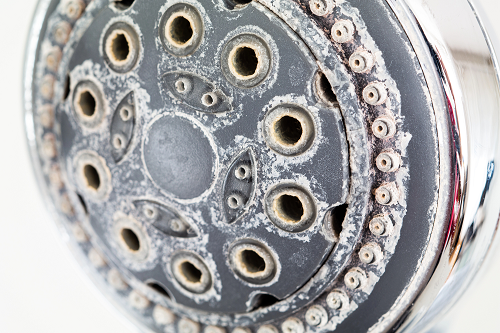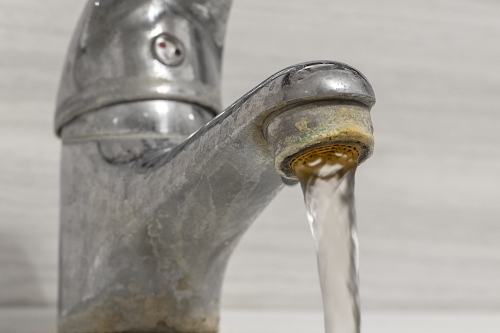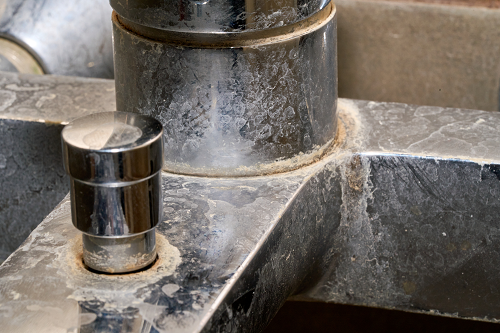Across the state of Florida, many residences face the challenge of managing exceptionally hard water. Hard water, characterized by elevated levels of minerals such as calcium, magnesium, and iron, adversely impacts water quality. In Florida, this often results in water with a pronounced and disagreeable taste, which can affect various daily activities, whether it be for consumption, cleaning, or personal hygiene. The detrimental effects of hard water extend beyond taste.
While it is pertinent to note that calcium and magnesium contribute positively to bone health, their presence in water becomes problematic within the context of household appliance and plumbing maintenance. These minerals lead to the formation of scale buildup or mineral deposits, which can impede the functioning of plumbing systems and contribute significantly to the deterioration and inefficiency of water-reliant appliances.
In response to these issues, IB AT UR Service offers a targeted solution to mitigate the troubles caused by hard water, safeguarding your plumbing and extending the lifespan of your appliances. Our expertise and services present homeowners with an essential resource for counteracting the adverse effects of hard water in Florida.
Drinking Water Samples – This is necessary and mandatory for someone looking to sell their home.
- FHA, VA, Ect.. – Every property that has a well are required to collect minimum one bacteria ( Total Coliform [ Total coliforms are a group of bacteria that can be found in soil, water and human or animal waste. They are generally not harmful, but their presence in drinking water can indicate that the water supply may be vulnerable to contamination by more harmful microorganisms.]/E. Coli [ E. Coli is a group of bacteria that can cause infection in your gut (GI tract), urinary tract and other parts of your body. Most of the time, it can live in your gut without hurting you. But some strains can make you sick with watery diarrhea, vomiting and fever. Shiga toxin-prducing E. Coli (STEC) is most likely to cause severe illness.]
The following will depend on the underwriter:
- Lead Testing – EPA has set the maximum contaminant level goal for lead in drinking water at zero because lead is a toxic metal that can be harmful to human health even at low exposure levels. Lead is persistent, and it can bioaccumulate in the body over time.
- You children, infants and fetuses are particularly vulnerable to lead beacuse the phyical and behavioral effects of lead occur at lower exposer levels in children than in adults. A dose of lead that ould have little effect on an adult can have a significant effect on a child. In children, low levels of exposure have neen linked to damage to the central and peripheral nervous system, learning disabilities, shorter stature, inpaired hearing, and impaired formation and function of blood cells.
- Nitrite/Nitrate – Infants below the age of six months who drink water containing nitrate in exess of the MCL (maximum contaminant level), which is 10 mg/l, could become seriously ill and , if untreated, may die. Symptoms include shortness of breath and blue-baby syndrome.
Home Owners are not required to have their water tested, but it’s recommended to have their water tested minimum annually for bacteria and depending on the area ither contaminants that are known to be in water. For example, mitrates, arsenic, ect…
Lift Station Maintenance:
The property that has their ownlift station will be responsible to maintain their lift station whether it’s pumping to a city or countymain, to their wastewater treatment plant.
*Most people think that once it’s flushed down the toilet , sink, ect..they don’t have to worry about it, but when the lift station pumps get clogged or worst burn up then they want to call the owner and /or property manager saying, “my toilet won’t flush!” not knowing it was their fault in the first place.
Our services include, but not limited to the following:
- Pulling pumps
- Cleaning debris from the pumps
- Replacing pumps
- Troubleshooting panels
- Grease preventive maintenance
We encourage our cleints to teach their residents to only flush those things with are suppose to be flushed and put the rest in the trash can. Thei is a never-ending battle and most of mu clients send out reminders monthly.
Septic Systems:
Septic Systems are required by Florida to have a maintenance entity.
These requirements are, including:
- Maintenance contracts – Homeowners must maintain a valid maintenance contract with an approved maintenance entity for the life of the system.
- Inspections – The maintenance entity must inspect and service the system at least twice per year.
- Inspection Report – The maintenance entity must submit inspections reports to the Florida Department of Health
- Department of Health will inspect the maintenance and performance of the system at least once per year.
- Operating Permit – Homeowners must maintain a current operating permit for the life of the system. The operating permit mist ne renewed every two years.
- Maintenance entity service agreement- THe maintenance entity service agreement must disclose that the property owner had the right to maintain their own system.
The Florida Department of Health (DOH) is the regulatory body that governs septic systems in Florida
Septic tanks should ne pumped every 3 to 5 years by a state licensed septage disposal company. Alternative systems with eletrical float switches, pumps, or mechanical components should be inspected more ofter, generally once a year.




